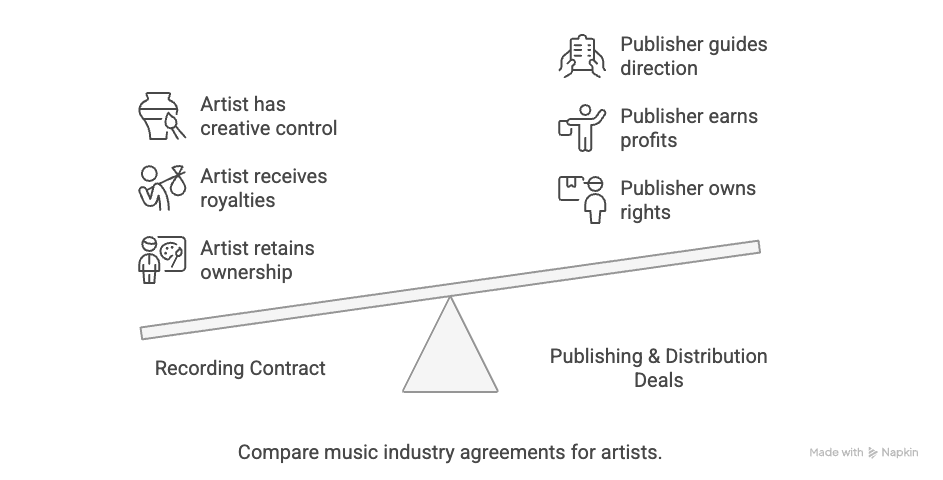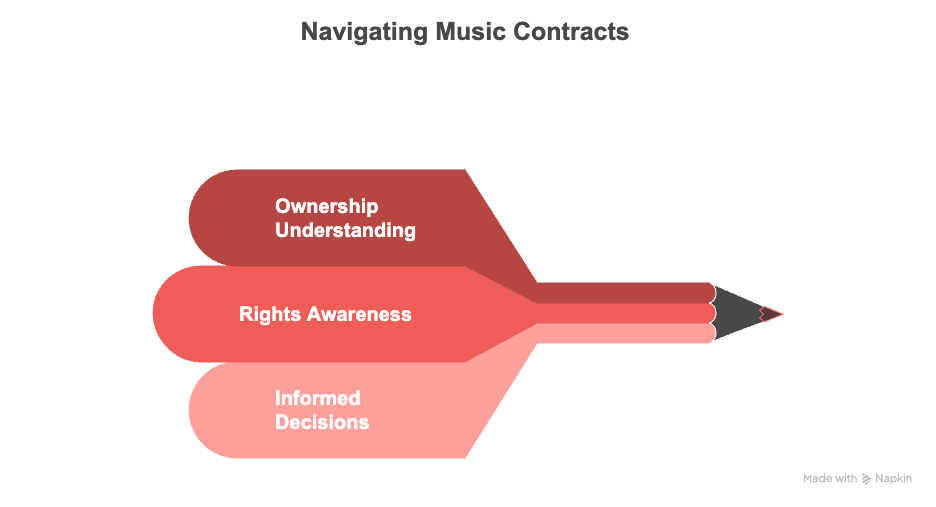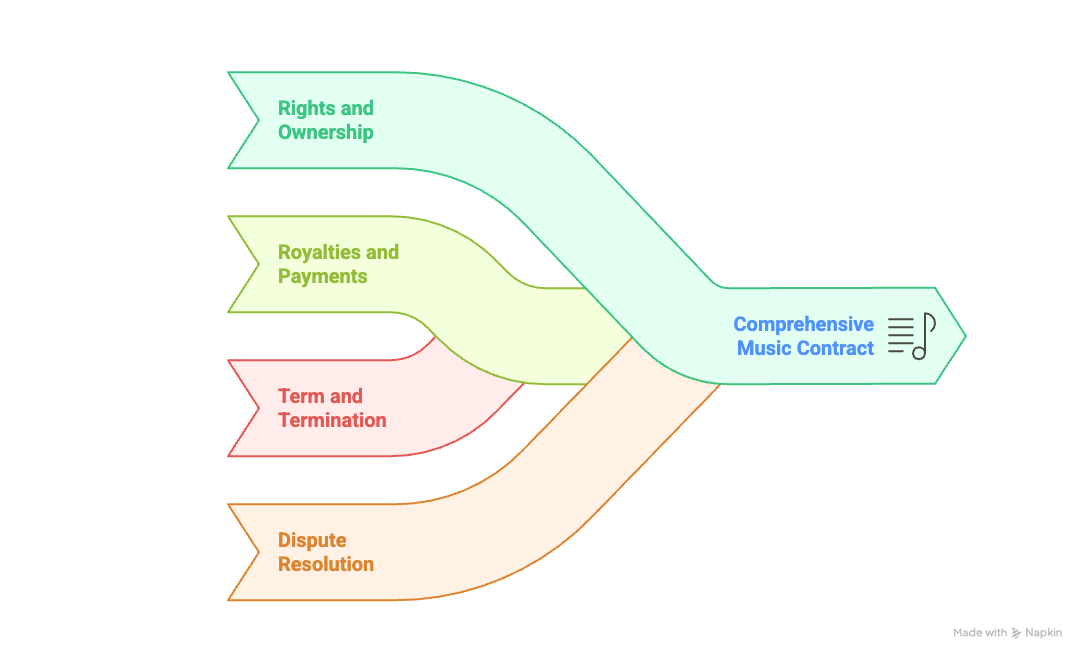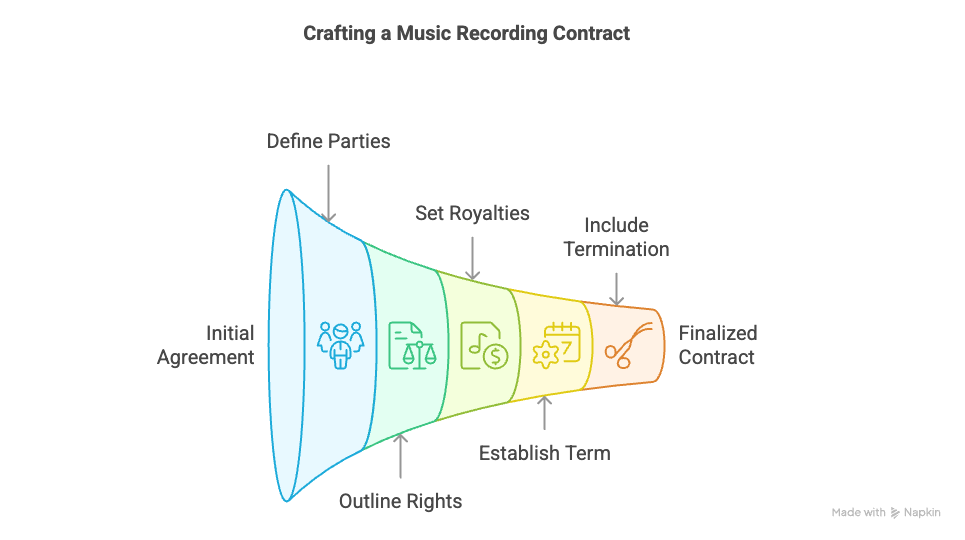
Recording Contract Vs. Publishing & Distribution Deals
Last Updated on May 11, 2025
For artists navigating the music industry, one of the most confusing challenges is understanding the difference between recording contracts, publishing agreements, and distribution deals. Each one involves rights, money, and responsibilities—but they apply to different parts of your music.
This guide breaks down the differences between these three music industry contracts so you can protect your rights, earn fairly, and avoid signing the wrong deal.
What Is a Recording Contract?
A recording contract governs how the actual sound recordings (the "masters") are created, owned, and monetized. Typically made between an artist and a record label or producer, it covers:
- Who owns the master recordings
- Royalties and revenue splits from streaming or sales
- Creative control and production deliverables
- Contract term and termination options
Bottom Line: It applies to the performance and production of recorded music.
What Is a Publishing Agreement?
A publishing contract governs the ownership and usage of the composition-the underlying song, including lyrics and melody.
Usually signed with a music publisher, this deal manages:
- Copyright registration and ownership of songs
- Royalties from sync, mechanical, and performance uses
- Administration of licensing and royalty collection
Bottom Line: It applies to the songwriting, not the sound recording.
What Is a Distribution Deal?
A distribution agreement outlines how music is delivered to platforms like Spotify, Apple Music, YouTube, or even vinyl/CD stores. These deals are typically non-exclusive and low-risk.
Distribution deals cover:
- Where and how the music is made available
- What percentage the distributor keeps (usually 10-20%)
- Reporting, payout frequency, and platform reach
Bottom Line: It gets your finished music into the world-but doesn’t cover creation or ownership.
Key Differences At a Glance
| Feature | Recording Contract | Publishing Agreement | Distribution Deal |
| Covers | Sound recordings (masters) | Compositions (songs) | Music release channels |
| Ownership Affects | Masters | Song copyrights | Typically none |
| Royalties Include | Streaming, sales, sync | Publishing, sync, mechanical | Streaming only |
| Typical Partner | Record label or producer | Music publisher | Digital distributor |
| Legal Scope | Production + release terms | Licensing + copyright admin | Delivery + reporting |
Why Artists Need to Understand the Difference
- Signing a recording contract doesn’t mean you’ve protected your songwriting rights.
- A publishing deal won’t cover your income from Spotify unless paired with a distribution plan.
- A distribution deal won’t help you register copyrights or collect licensing income.
Many artists sign the wrong deal because they confuse these agreements. Clarifying the role of each helps you:
- Retain ownership
- Increase royalty income
- Avoid legal surprises
Final Thoughts
Each of these contracts plays a specific role in your career. Smart artists treat them separately and negotiate each one based on value-not promises.
Download our free templates or get legal help understanding your music contracts.
Download the Free Music Recording Contract Template
Ready to apply what you've learned? Get instant access to the Music Recording Contract PDF - free, editable, and built for Canadian businesses. No sign-up required.
Frequently Asked Questions
Answers to common questions about Recording Contract Vs. Publishing & Distribution Deals.
Do I need both a recording and a publishing deal?
Yes. A recording deal covers the sound recording, while a publishing deal covers the song. Both are needed to fully protect your rights and income.
Can I self-publish my music and still sign a distribution deal?
Absolutely. Many indie artists retain full publishing rights while using digital distribution platforms to release music.
What happens if I only sign a recording contract?
You’ll earn from streaming and sales, but you may miss out on publishing royalties like sync, mechanical, and performance income.
Is a distribution deal the same as a record deal?
No. A distribution deal only puts your music on platforms; it doesn’t cover recording costs, rights ownership, or royalties.
Who owns the master in a distribution deal?
Usually, you do. Distribution agreements typically don’t transfer ownership unless stated otherwise.
Can a label also be my publisher?
Yes, but it’s best to negotiate each role separately to avoid conflicts and ensure transparency.
How do royalties differ across these deals?
Recording contracts cover sales/streaming royalties; publishing deals involve sync, mechanical, and performance royalties; distribution deals provide platform-based payout shares.
Should I hire a lawyer to review these deals?
Yes. Each contract type carries long-term implications. Legal review is highly recommended.
Explore More in Creative Digital Contracts
Discover curated templates in Creative Digital Contracts to help your business stay compliant and efficient.


